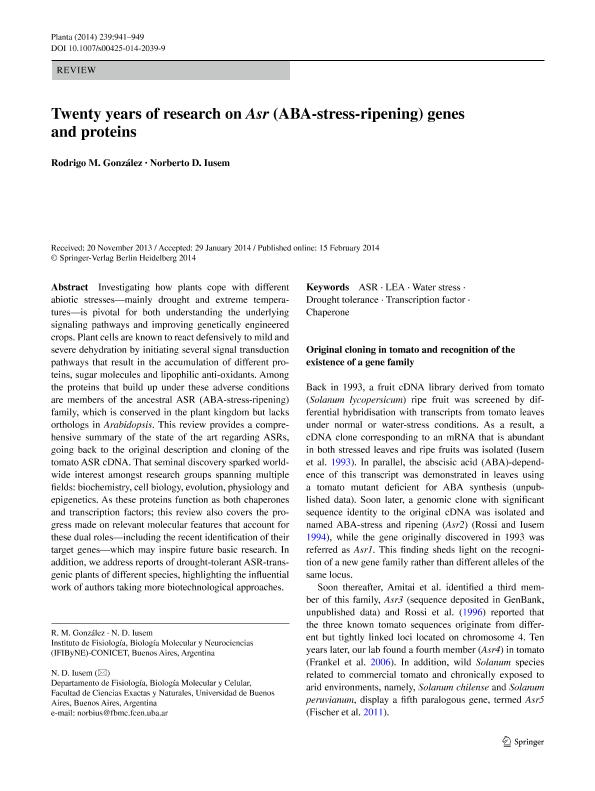Mostrar el registro sencillo del ítem
dc.contributor.author
González, Rodrigo Matías

dc.contributor.author
Iusem, Norberto Daniel

dc.date.available
2017-12-13T15:35:40Z
dc.date.issued
2014-02
dc.identifier.citation
González, Rodrigo Matías; Iusem, Norberto Daniel; Twenty years of research on Asr (ABA‑stress‑ripening) genes and proteins; Springer; Planta; 239; 5; 2-2014; 941-949
dc.identifier.issn
0032-0935
dc.identifier.uri
http://hdl.handle.net/11336/30396
dc.description.abstract
Investigating how plants cope with different abiotic stresses—mainly drought and extreme temperatures—is pivotal for both understanding the underlying signaling pathways and improving genetically engineered crops. Plant cells are known to react defensively to mild and severe dehydration by initiating several signal transduction pathways that result in the accumulation of different proteins, sugar molecules and lipophilic anti-oxidants. Among the proteins that build up under these adverse conditions are members of the ancestral ASR (ABA-stress-ripening) family, which is conserved in the plant kingdom but lacks orthologs in Arabidopsis. This review provides a comprehensive summary of the state of the art regarding ASRs, going back to the original description and cloning of the tomato ASR cDNA. That seminal discovery sparked worldwide interest amongst research groups spanning multiple fields: biochemistry, cell biology, evolution, physiology and epigenetics. As these proteins function as both chaperones and transcription factors; this review also covers the progress made on relevant molecular features that account for these dual roles—including the recent identification of their target genes—which may inspire future basic research. In addition, we address reports of drought-tolerant ASR-transgenic plants of different species, highlighting the influential work of authors taking more biotechnological approaches.
dc.format
application/pdf
dc.language.iso
eng
dc.publisher
Springer

dc.rights
info:eu-repo/semantics/openAccess
dc.rights.uri
https://creativecommons.org/licenses/by-nc-sa/2.5/ar/
dc.subject
Asr
dc.subject
Lea
dc.subject
Water Stress
dc.subject
Drought Tolerance
dc.subject
Transcription Factor
dc.subject
Chaperone
dc.subject.classification
Otras Ciencias Biológicas

dc.subject.classification
Ciencias Biológicas

dc.subject.classification
CIENCIAS NATURALES Y EXACTAS

dc.title
Twenty years of research on Asr (ABA‑stress‑ripening) genes and proteins
dc.type
info:eu-repo/semantics/article
dc.type
info:ar-repo/semantics/artículo
dc.type
info:eu-repo/semantics/publishedVersion
dc.date.updated
2017-12-12T18:52:44Z
dc.identifier.eissn
1432-2048
dc.journal.volume
239
dc.journal.number
5
dc.journal.pagination
941-949
dc.journal.pais
Alemania

dc.journal.ciudad
Berlin
dc.description.fil
Fil: González, Rodrigo Matías. Consejo Nacional de Investigaciones Científicas y Técnicas. Oficina de Coordinación Administrativa Ciudad Universitaria. Instituto de Fisiología, Biología Molecular y Neurociencias. Universidad de Buenos Aires. Facultad de Ciencias Exactas y Naturales. Instituto de Fisiología, Biología Molecular y Neurociencias; Argentina
dc.description.fil
Fil: Iusem, Norberto Daniel. Consejo Nacional de Investigaciones Científicas y Técnicas. Oficina de Coordinación Administrativa Ciudad Universitaria. Instituto de Fisiología, Biología Molecular y Neurociencias. Universidad de Buenos Aires. Facultad de Ciencias Exactas y Naturales. Instituto de Fisiología, Biología Molecular y Neurociencias; Argentina
dc.journal.title
Planta

dc.relation.alternativeid
info:eu-repo/semantics/altIdentifier/doi/http://dx.doi.org/10.1007/s00425-014-2039-9
dc.relation.alternativeid
info:eu-repo/semantics/altIdentifier/url/https://link.springer.com/article/10.1007%2Fs00425-014-2039-9
Archivos asociados
